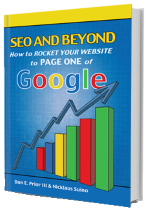16 Common SEO Words You Need to Know!
Algorithm – the complex and secret formula by which Google and the other search engines evaluate your website to decide how high (or low) to rank it.
Backlink – a link from a site other than your own back to your site. Generally, more of these are better, and the more prominent the site that provides the link, the more it boosts your Page rank.
Content – the actual words on your site related to your product, service, or subject.
Flash – a type of web programming that can create “flashy” graphics. Generally, the search engines have trouble evaluating sites with too much Flash.
html – stands for “hypertext markup language.” This is the workhouse code for websites, and should usually be the majority of code used.
Java – another programming language, commonly used to support utilities, games, and business applications.
Keyword – a word related to your product, service, or subject, especially one that has a high likelihood of being typed into a search engine.
Key phrase – a phrase related to your product, service, or subject, especially one that has a high likelihood of being typed into a search engine.
Link – a word, phrase, image, or button that takes the web user to another web page, email, or download. Same as “hyperlink” in this context.
Meta Tag – text found in the source code for a web page that provides additional information for the search engines.
Page Title – found in the gray or blue space at the top of your browser window, this is the title of the particular page your are looking at.
Reciprocal Link – a link to your web page from another web page, given in return for a link that you provide to the other user.
SEO – “Search Engine Optimization.” It’s what SEO Ann Arbor does so well!
Search results – the list of websites you get back when you do a search in Google, Yahoo! or one of the other search engines.
Submit – you should always submit a new website to Google and the other search engines. Their “web crawlers” will then review the site and begin including it in search results.
Three Way Linking – a method to “trick” the search engines by placing a link from site A to site B, a link from site B to site C, and a link from site C to site A. This is supposed to avoid having the benefits of backlink “canceled out” by simply linking back.
URL – “Uniform resource locator.” This is the actual address of your website on the web. An example might be http://seoannarbor.com/







